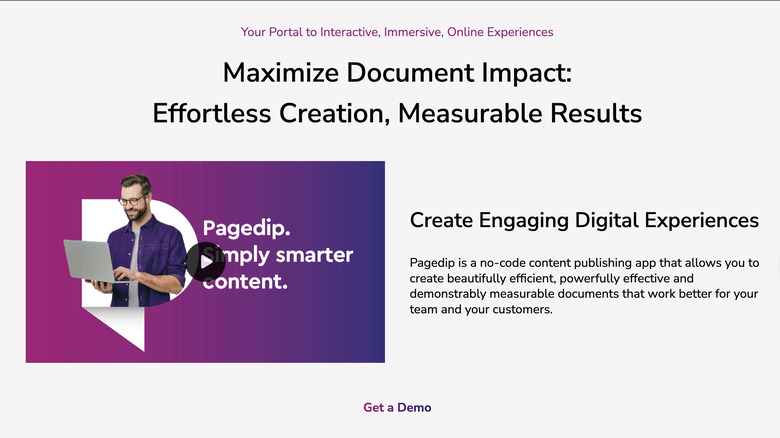What Happened To Beneath The Ink From Shark Tank Season 6?
Despite the preponderance of social media apps, streaming services, and mobile gaming, the ebook market remains a valuable segment in the entertainment industry. Worldwide, its value is expected to reach $14.92 billion by 2025. In the U.S., it is projected to generate $5.38 billion in revenue in the same year. The growing number of consumers is perceived to be a product of the shifting preference for digital media over traditional print books with the advancements in smartphone, tablet, and e-reader technologies.
In their quest to conquer the ebook market, business partners Alex Milewski and Sherisse Hawkins came up with a technology that enhances the overall experience of reading digital books. Instead of the usual page-by-page turn, they developed a way for readers to become more interactive with what they are reading through clickable pop-up annotations that provide additional context, definitions, multimedia elements, and background information without disrupting the flow of the ebook. The pair called this technology Beneath the Ink.
In a stricter sense, Beneath the Ink is more than the pop-up annotations; it is a digital publishing platform that allows authors and publishers to embed additional content through what Milewski and Hawkins called "Binks" or "Beneath the Ink Links." Its purpose is to enrich the reading experience by making it more immersive and bridge the gap between traditional books and modern, interactive media. Their invention seemed promising, so in 2014, the partners pitched the platform on ABC's "Shark Tank."
What happened to Beneath the Ink on Shark Tank?
Beneath the Ink appeared in "Shark Tank" Season 6, hoping to secure investment to grow its platform. Hawkins and Milewski emphasized during their pitch the unique value proposition of Binks and how they could significantly transform the digital reading experience. The partners sought $350,000 for 10% equity while valuing Beneath the Ink at $3.5 million, according to Shark Tank Insights.
The software engineers had worked for Time Warner, Disney, and many start-ups before focusing on their own firm. Explaining why they thought their product would grow significantly in the coming years, they cited the booming ebook publishing industry. However, this did not translate to what they were earning when the episode was being filmed. Monthly membership was $12 per month, and clients needed to pay a $199 export fee. They also mentioned royalties. But during their pitch, they only had eight books with Binks to present. They tried to sway the Sharks by citing discussions with "big" authors in the pipeline, but the investors were still unconvinced.
The first to bow out was Kevin O'Leary because he believed the product was still in its nascent stage. Next was Mark Cuban, who pointed out that the technology was not that revolutionary. Lori Greiner felt their business model seemed too complex, so she's out. Barbara Corcoran tapped out because she doubted the concept. Robert Herjavec also did not invest since he was not sure of their revenue model. In the end, the pair left the tank without an offer.
Refocusing and rebranding after its Shark Tank appearance
Despite not landing a deal with any of the Sharks, Hawkins and Milewski continued operating Beneath the Ink and refining its platform. They resumed developing their product and looked for ways to make their digital reading technology more engaging. They also tried to secure deals and partnerships with more authors and publishers since making their television debut via "Shark Tank."
However, scaling the business proved challenging. The digital publishing space is notoriously competitive, dominated by major players like Amazon and Apple. Beneath the Ink seemingly struggled to carve out a significant market share, especially as other platforms began introducing interactive elements into their ebook offerings. The company's reliance on securing partnerships with publishers — many of whom might have been hesitant to adopt technology from a new brand — also hindered its growth.
By 2016, Beneath the Ink had pivoted its business model to focus more on content management, rebranding itself to Pagedip. According to its website, the SaaS firm now offers a no-code service that enables users to enhance their documents for their clients or their own teams. It also has an analytics feature to help users monitor content performance and see areas with potential business outcomes.
The rebrand proved to be the right direction for Beneath the Ink as the company started to become profitable in 2022. The firm reportedly generated $2.5 million in annual revenue that year. As of August 2024, Pagedip's net worth was at $3.025 million.
What's next for Pagedip and its co-founders?
In 2024, Pagedip was selected to be among the 20 brands for the Google for Startups Founders Funds. The tech giant awarded the firm with non-dilutive cash and Google Cloud credits, as well as support for its further advancements in the business industry. Among these was the mentorship program for Google's AI program. Pagedip has already confirmed that its AI tool will come out in early 2025.
Unfortunately, Milewski is no longer part of the company. Based on his updated LinkedIn profile, he left Beneath the Ink in 2016, when the company transitioned to Pagedip. He moved on to other ventures after that, founding the Colorado Hip Hop Collective, Block 1750, and MOVE Global — all of which centered on his passion for dance and movement. He also founded a short-lived educational experience program called INSPIRE Inc. that run from January 2023 to September 2024. As of late, he is focused on his other dance company, Experiments in Rhythm, which he started in January 2022.
Meanwhile, Hawkins stayed with Beneath the Ink throughout the transition and became the CEO of Pagedip. According to her LinkedIn profile, she's a risk-taker with a "proven record in meeting impossible deadlines, delighting customers, and re-imagining how things can be done." When Pagedip was announced as one of Google's chosen startups, Hawkins was lauded for revolutionizing content creation.



